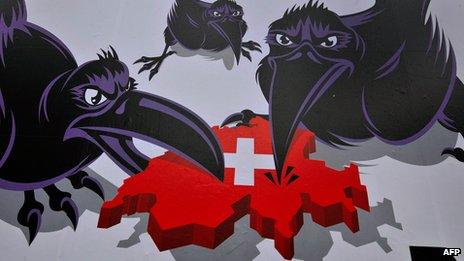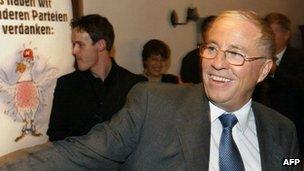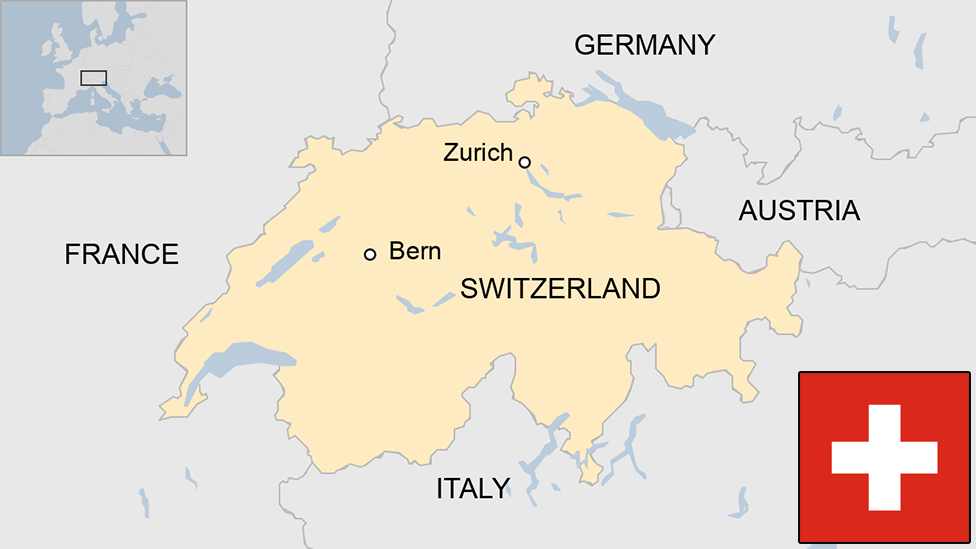Sceptical Swiss locked into EU's embrace
- Published

An SVP poster plays on fears of foreigners tearing the Swiss social fabric
Twenty years ago this week Swiss voters said no, by the tiniest of margins, to membership of what was then the European Economic Area.
Had they said yes, it would have been the first step towards full membership of the European Union, and by now Switzerland would probably be one of the more longstanding members of the EU.
But in a result which surprised many, and which is still the closest ever vote in Switzerland's post-war history, 49.7% of those voting said yes to membership, but 50.3% said no.
Switzerland's economy minister at the time, the late Jean-Pascal Delamuraz, called it "Black Sunday", warning of damage to the Swiss jobs market, and a young generation of Swiss who would be "deprived".
And 20 years on many Swiss, like political scientist Georg Lutz at the University of Lausanne, still remember the disappointment of that day very clearly.
"It was a big surprise, it was one of the first times I was allowed to vote and I voted in favour," he remembers.
"And suddenly there was a no, which hardly anybody expected, because we were in the times when it was the end of the Cold War, there was this liberal movement towards Europe. And suddenly it was almost the reverse dynamic."
Success in isolation
But two decades later the disappointment has eased, and the dire warnings of Mr Delamuraz have not come true.

Despite Christoph Blocher's campaign Switzerland complies with many EU laws
Quite the contrary in fact. Switzerland's economy is doing very well - its unemployment rate, at less than 3%, is the envy of its European neighbours.
Christoph Blocher of the right-wing Swiss People's Party (SVP) was the key figure in the No campaign 20 years ago. He appealed to a traditional image of Switzerland, his rallies were determinedly nationalistic, he even often appeared carrying large cow bells. Also, as one of Switzerland's leading businessmen, he spent 2m francs (£1.3m; $2.2m) of his personal fortune on the campaign.
Looking at Switzerland today, he is as convinced as ever that his go-it-alone policy is the only right one.
"Twenty years ago I heard the same thing all the time: there's no alternative to European Union membership, there's no alternative to those colonial agreements (with Brussels)," he told parliament earlier this year.
"But look at the alternatives the Swiss people have voted for, and compare them with the intellectual bankruptcy outside our borders. The alternative is to stay true to Switzerland, to represent our strengths, our financial sector, our jobs, our well-being and our freedom. The alternative is to say no [to agreements with Europe]."
Accepting EU policies

Swiss customs at Meyrin: The eurozone stops here
Analysts of Switzerland's relationship with Europe, however, say it is not quite as simple as that. The Swiss No vote coincided with a downturn in Switzerland's economy - both the public deficit and unemployment were rising.
Swiss political and business leaders viewed the prospect of being shut out of the European market with horror, and just weeks after the No vote Swiss diplomats were in Brussels, nervously presenting a request to negotiate bilaterally.
They knew that in order to preserve their access to Europe's lucrative trade markets, they would have to sign up to the very policies the Swiss voters had rejected. And since 1992 Switzerland has concluded more than 100 agreements with the EU, among them the key elements of EU policy.
"Although Switzerland turned down membership, in the years afterwards all the major issues like free movement of people have been agreed with the EU," says Georg Lutz.
"So the situation isn't so different these days, especially with regard to migration."
Magnet for EU workers
Switzerland's agreement to free movement of people is a particular irony: in 1992 opinion polls showed that one of the key factors in the No vote was a fear of immigration, and of Switzerland being forced to let in too many foreign workers.
At that point foreigners in Switzerland made up 20% of the population. Today the figure is 25%, and the increase is due almost entirely to the arrival of EU citizens. Switzerland has in fact seen much higher numbers of EU workers coming in than many of its neighbours who are full members of the EU.
So is Switzerland better off outside the EU? "No one will ever know," says Mr Lutz. "Yes the economy is healthy, unemployment is low, but nobody will ever know if Switzerland might have been even more successful if the country had joined the European Union."
Unsurprisingly, given the crisis in the eurozone, opinion polls today show the Swiss have little enthusiasm for Brussels: barely 11% say they would consider membership.
And now a new era of agonised decision-making may be approaching, because Brussels has told the Swiss government the EU is no longer interested in pursuing bilateral agreements. Instead Brussels wants Switzerland to automatically adopt EU law - a suggestion which is already causing Swiss hackles to rise.
Bilateral stalemate
Meanwhile various unsigned bilateral agreements, including a crucial one on energy, are gathering dust in Brussels. A deal with Europe is fundamental to the Swiss economy, so the current stalemate is not an option.
But when one Swiss politician recently proposed going back to square one, and voting again on joining the European Economic Area, he was ridiculed, with colleagues suggesting he "drink a glass of Swiss wine to clear his head".
Any suggestion that Switzerland should officially join Europe is still, it seems, political dynamite, and very few in the political establishment dare touch it.
A pity, says Georg Lutz, since, he believes, both sides might have benefited over the last 20 years from a closer relationship. The EU in particular, he suggests, might have learned something from Switzerland's prudence - in particular its legal limits on public debt.
"(If Switzerland had been a member) I guess we would have pushed for fiscal conservatism throughout the entire time, because that's the tradition in our country as well.
"But whether Switzerland would have succeeded with that, I have some doubts."
- Published19 June 2023

- Published18 April 2012
- Published20 March 2012
